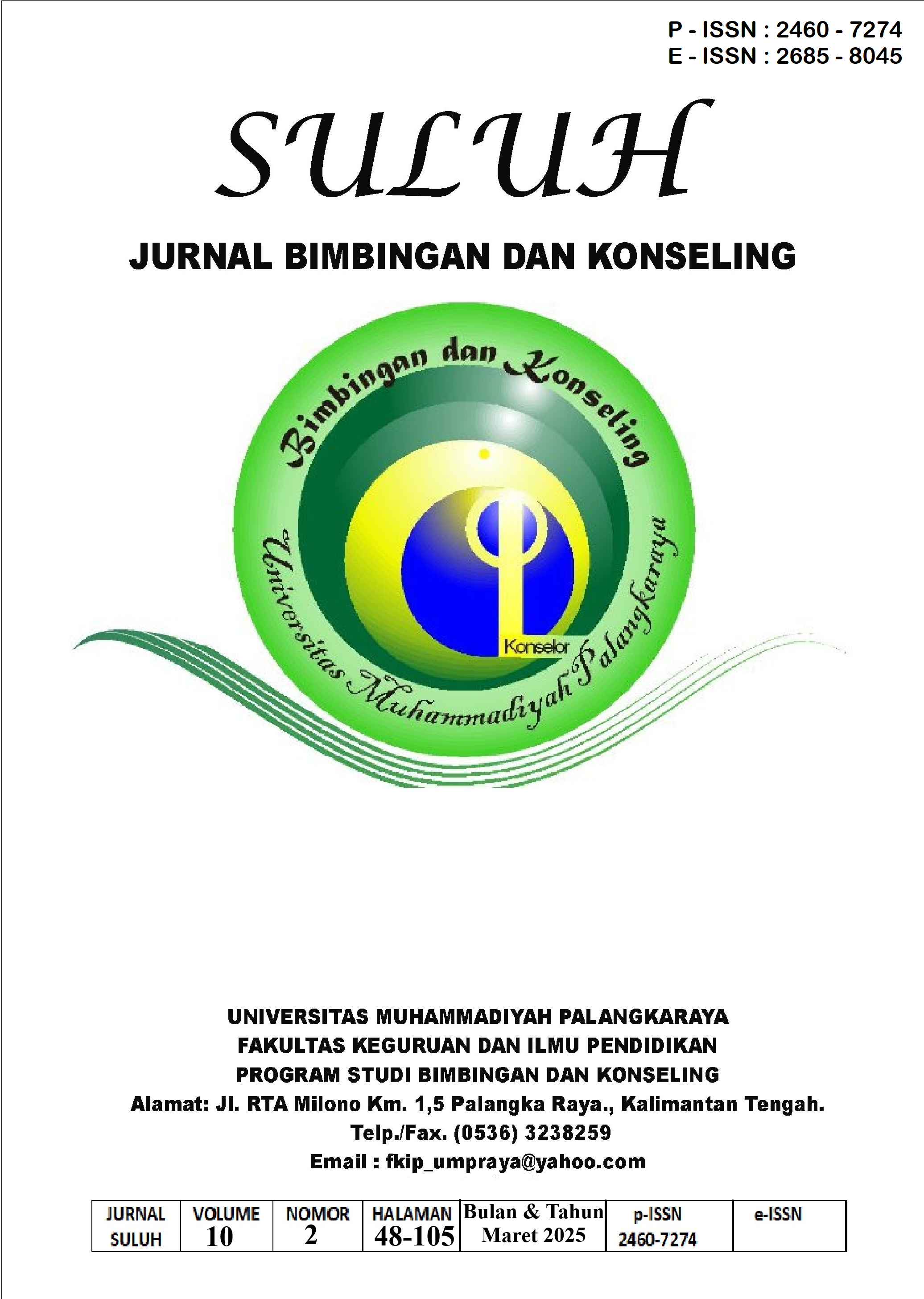Evaluation of the child-friendly school program (SRA) in Public Elementary Schools in East Kotawaringin Regency Using the CIPPO Model
Main Article Content
Abstract
The aim of this research is to evaluate the implementation of child-friendly school programs in public elementary schools in Mentawabaru Ketapang District, East Kotawaringin Regency. The research method used in this research is qualitative research with the CIPPO (Context, Input, Process, Product and Outcome) evaluation model. The results of this research showed that: (1) the results of an evaluation of the context in which the SRA Program was implemented were in accordance with the legal basis and in accordance with community needs; (2) the results of the input evaluation are the unavailability of KHA-certified teaching staff and the need for supporting facilities that comply with SRA regulations; (3) the results of the process evaluation aspect which is based on the linkage of the program with the internalization of child-friendly values in the curriculum and all learning processes which are very good but there is still minimal stakeholder cooperation; (4) the results of the evaluation of the results during which the SRA program was implemented can be seen from the percentage reduction in violations committed by students by an average of 23.6%; (5) the results of the output aspect are that students have felt a positive impact on the formation of character or attitudes or behavior which then has an impact on the school environment and the community environment. It is hoped that the results of this research can become a reference for improvement and improvement for all parties involved in implementing the SRA program.
Downloads
Article Details

This work is licensed under a Creative Commons Attribution-ShareAlike 4.0 International License.
All rights reserved. This publication may be reproduced, stored in a retrieval system, or transmitted in any form or by any means, electronic, mechanical, photocopying, recording.
References
Anderson J. et. al. (2016). Lively Social Space, Well-Being Activity, and Urban Design: Findings from a low-cost community-led public space intervention. Journal Environment and Behavior, Vol. 49, No. 6. http://journals.sagepub.com/doi/abs/10.1177/0013916516659108
Ambarsari, L., & Harun, H. (2018). Sekolah Ramah Anak Berbasis Hak Anak di Sekolah Dasar. Profesi Pendidikan Dasar, 1(1), 10. DOI : https://doi.org/10.23917/ppd.v1i1.6111
Artadianti, K., & Subowo, A. (2016). ImplementasiAsrorun Ni’am Sholeh dan Lutfi Humaidi., Panduan Sekolah & Madrasah Ramah (Jakarta: Erlangga, 2016), hlm.6
Banamtuan, E. 2019. “Evaluasi Program Sekolah Ramah Anak (Sra) Berbasis Nilai Di SD Inpres Liliba Kota Kupang Tahun Pelajaran 2012/2013.” Jurnal Ilmu Pendidikan, 4(1):1-12.
Beny Sutami, Dody Setyawan, Noora Fithriana, Implementasi Program Sekolah Ramah Anak dalam Mewujudkan Kota Layak Anak di Kota Batu, Reformasi, Volume 10, Nomor 1, (Universitas Tribhuwana Tunggadewi, 2020), 20.
Broberg A. et. al. (2013). Child-friendly urban structures: Bullerby revisited. Journal of Environmental Psychology 35, hlm. 110-120
Bulkani. (2021). Evaluasi Pembelajaran. Akademia Pustaka
Gulson, K. N., and S. Sellar. 2018. “Emerging Data Infrastructures and the New Topologies of Education Policy.” Environment and Planning D: Society and Space 1(1):1–12. doi:https://doi.org/10.1177/026377581881314.
Jerome L., et. al. (2015). Teaching and learning about child rights: A study of implementation in 26 countries. UNICEF
Kamil, D., Mukminin, A., & Kassim, N. L. A. (2013). From Education Policy to Class
School-Based EFL Syllabi. Excellence in Higher Education, 4, 86–107
Kartini, N.H., (2017). Evaluasi Program Baitul Arqam Bagi Karyawan Di Universitas Muhammadiyah Palangkaraya. Anterior Jurnal, 16(2), 144-157.
Kegode, G., & Kadenyi, A. M. (2016). Kenya’s concept of child friendly school seen in light of julius nyerere’s philosophy of education. International Journal of Innovative Research and Development, 5(9), 378–385.
Kurniawan, Ansar, & Arwildayanto. (2020). Implementasi Program Sekolah Ramah Anak Pada Sekolah Menengah Atas, 27(1), 170-183.
DOI:https://doi.org/10.17509/jap.v26i2.
Lawrence, J. E., and U. A. Tar. 2018. “Factors That Influence Teachers’ Adoption and Integration of ICT in Teaching/Learning Process.” Educational Media International 55(1):79–105.
Lian, B., Kristiawan, M., & Fitriya, R. (2018). Giving creativity room to students through the friendly school’s program. International Journal of Scientific and Technology Research, 7(7), 1–7. https://doi.org/10.31219/osf.io/zebpd
Nura Azkia. (2020). Evaluasi Program Sekolah Ramah Anak di SD Negeri Ngupasan Yogyakarta Menggunakan Model Cipp (Context, Input, Process Dan Product). Thesis, UIN Sunan Kalijaga.
Pemerintah Indonesia. Undang-Undang Nomor. 23 Tahun 2002 Tentang .Perlindungan Anak.
P2PA. (2014). Nomor 8 Tahun 2014 tentang Pemberdayaan Perempuan dan Perlindungan Anak.
Siegle, D., E. J. Gubbins, P. O’Rourke, S. D. Langley, R. U. Mun, S. R. Luria, and J. A. Plucker. 2016. “Barriers to Underserved Students’ Participation in Gifted Programs and Possible Solutions.” Journal for the Education of the Gifted 39(2):103–131.
Michael Huberman and B Miles Mathew, Analisa data kualitatif, buku sumber tentang metode-metode baru, penerjemah; tjetjep rohendi rohidi, (Jakarta: Universitas Indonesia Press, 1992), hlm.16
Mustari, N. (2015). Pemahaman Kebijakan Publik. Luetika Nouvalitera.
Ndari, S. S., and C. Chandrawaty. 2019. “Peran Guru Dan Orangtua Dalam Implementasi Sekolah Ramah Anak Tanpa Kekerasan Melalui Parenting Di PAUD Bintang Dan PAUD Rumahku.” Pp. 480–496 in Prosiding Kolokium Doktor dan Seminar Hasil Penelitian Hibah.
Nuraeni, Lenny, and Rita Nurunnisa. 2020. “Efektivitas Program Pembelajaran Ramah Anak Dalam Meningkatkan Keterampilan Sosial.” Jurnal Tunas Siliwangi Vol.6 No.1(1):6–15.
Subur, Irham Nugroho dan Qosim Muhammad Nanang, “Implementasi Sekolah Ramah Anak Dalam Membentuk Budaya Sekolah Di SDN Geger Tegalrejo. Prosiding Konferensi Nasional Ke- 7 Asosiasi Program Pascasarjana Perguruan Tinggi Muhammadiyah ‗Aisyiyah (APPPTMA) Jakarta: 23-25 Maret 2018.Hal 353-357.
Sukardi. 2008. Evaluas iPendidikan Prinsip dan Operasionalnya, Jakarta, Bumi Aksara.
Susan. (2021). Efektivitas Program Sekolah Ramah Anak Dalam Mengembangkan Sekolah Berkarakter Di Sekolah Dasar Negeri 028266 Binjai. Tesis, Universitas Muhammadiyah Sumatera Utara.
Williamson, Ben, and Nelli Piattoeva. 2019. “Objectivity as Standardization in Data-Scientific Education Policy, Technology and Governance.” Learning, Media and Technology 44(1):64–76. doi: 10.1080/17439884.2018.1556215.
Yuliah, E. (2020). Implementasi Kebijakan Pendidikan. Jurnal At-Tadbir : Media Hukum Dan Pendidikan, 30(2),129—153. https://doi.org/10.52030/attadbir.v30i2.58
Yosada, Kardius Richi, and Agusta Kurniati. 2019. “Menciptakan Sekolah Ramah Anak.” Jurnal Pendidikan Dasar Perkhasa: Jurnal Penelitian Pendidikan Dasar 5(2):145–54. doi: 10.31932/jpdp.v5i2.480.

